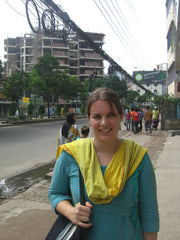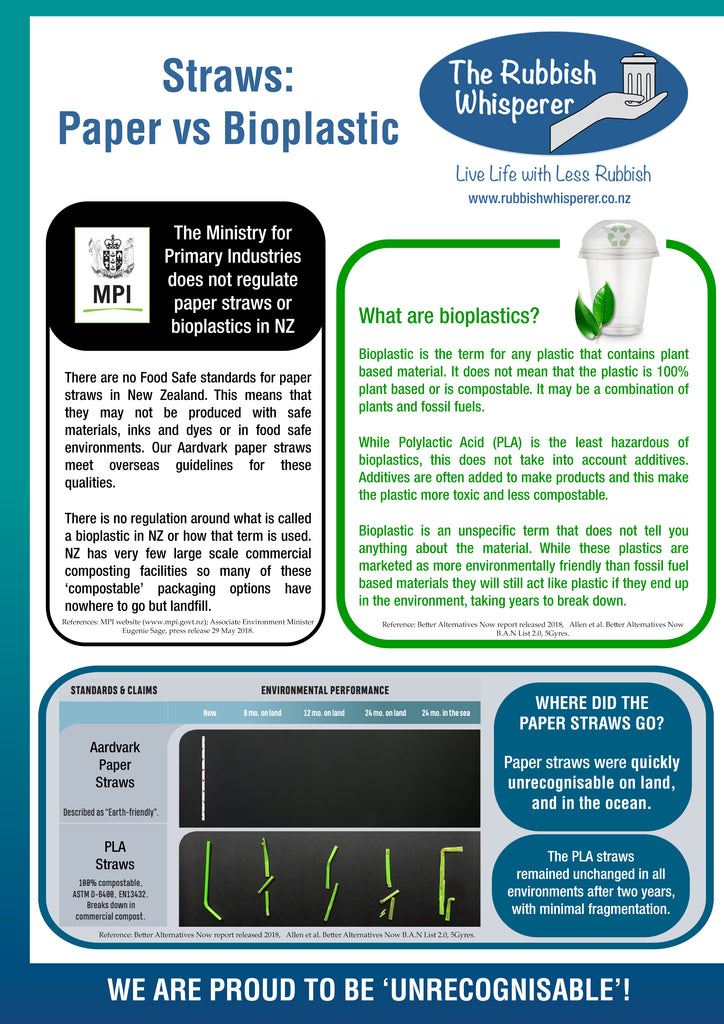
Paper straws are even better for construction than plastic ones because they are heaps sturdier and so you can build more elaborate models.
We can ship paper straws to you once NZ is in Alert Level 3 and we've got some packs of multicoloured crafting straws made up ready to go or purchase packs to make sea creatures
Got heaps of skills? Make a full underwater scene like the headdress from our Wearable Arts outfit (straws are used as the coral skeleton).

Got no skills? Well, I made this spider (stop laughing!)

Lacking ideas? Just google straw crafts - anything you can make with plastic straws you can make with paper ones! Send us your photos and we'll stick them up on Facebook :)
]]>
I had heard about ‘no shampoo’ or ‘no poo’ but wasn’t sure how it would work on my hair and I was nervous about how terrible my hair would look before it reached its equilibrium (as people said that it would).
Just before Christmas I decided to give it a go and stopped washing my hair. I rinsed it with water, swam in the sea a lot and rinsed it with apple cider vinegar. For the first 2-3 weeks it was greasy and pretty horrible, but the sea water and apple cider vinegar helped to keep the oil under control. Then, after 4 weeks I started to see some improvement and at 6 weeks, it was looking great! Amazing! 6 weeks seems to be the average amount of time for hair to reach equilibrium.
I haven’t washed my hair with shampoo for nearly 5 months. If it gets oily (especially after running or working in the garden) I rinse it with apple cider vinegar and then it looks great again. Make sure you rinse out the vinegar really well so the smell doesn’t linger!

When the motu started, I decided that I might as well not even bother with the vinegar rinse. I started to brush my hair more and, 1 week in, a rinse with water is all it needs.
Here’s my top tips to going ‘no poo’:
- Go cold turkey – just stop washing it with shampoo.
- Rinse with water and apple cider vinegar
- Brush it a lot
- Stick out the oily patch 2-3 weeks in!
- Feel great about all the money and time you save!
‘Oily hair can be remedied by being washed once in two weeks, while hair with a normal amount of oil should not be washed more than once a month unless one is engaged in dusty work or is travelling constantly.’ (Marin Journal, 1901)
]]>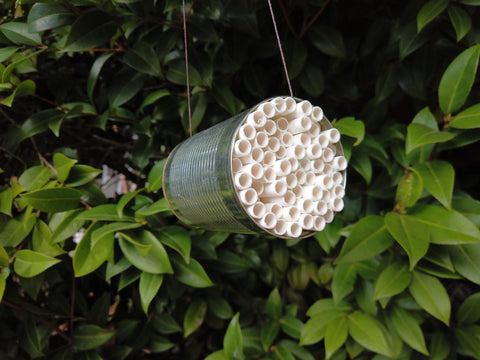
NZ has 28 species of native bees/ngaro huruhuru. Unlike honey bees, they don't live in hives but in holes in the ground or plant material.
You can make your own bee/bug hotel to encourage more beneficial insects into your garden (and it's the quickest crafting project ever!)
1. Completely remove the lid and wash and dry a can.
2. Using a nail, make a hole in the base of the can, near the top.
3. Thread some strong (but not plastic) string through the hole.
4. Cut paper straws so that they are just shorter than the tin can (the ones in our picture are a bit long!). Then the straws won't get wet in the rain.
5. Put the straws into the can so they are nice and snug and don't fall out.
6. Hang your hotel in dappled shade, pointing slightly downwards so any water runs out.
7. Wait to see who comes to visit!
To increase populations of native bees and bugs plant native trees and shrubs, don't use pesticides and visit For The Love of Bees to find out more.
]]>

Here's the recipe...
Making Eco-friendly Glitter from Salt
- Preheat oven to 180 degrees C
- Mix salt with food colouring until you get the colour you like.
- Spread onto a baking tray.
- Bake for 10-15 minutes.
- Cool
To make Reindeer food
Mix rock salt from above recipe with oats, put into a jar and tie a ribbon or string around it using any scraps you have. We added a reindeer picture from an old Christmas card to add a little extra 'reindeery goodness'.

]]>
]]>
Reducing carbon emissions requires action from all of us – government, businesses and individuals. So here’s a quick guide on what you can do…
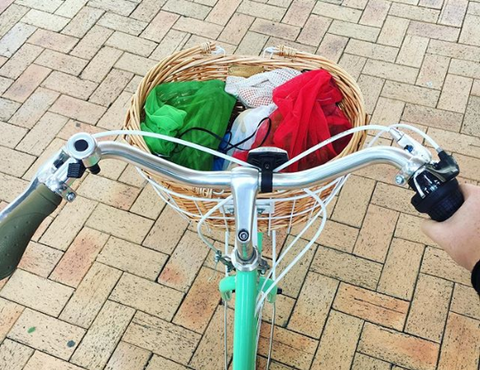
Ride Your Bike Is it a coincidence that Denmark is consistently ranked in the top 3 happiest countries and also has one of the highest per capita rates of cycling? Maybe, but they’ve also found that children who cycle and walk to school are much better at concentrating. The more people who cycle the safer it will be, so download a copy of Christchurch’s cycling maps and get on your bike (Also, Denmark and Christchurch are both flat, so we have no excuse!)
Support Local and Ethical Businesses If we want a world where businesses take responsibility for the environment, we have to support them. Shopping locally keeps money in the community and reduces carbon emissions and packaging. When you shop from ethical businesses your dollars are working all the way down the supply chain improving lives and the environment. To help you out, we've put all our NZ-made products on sale until the end of May.
Eat Less Meat. But this doesn’t mean you have to be vegan or even vegetarian, if we all switched to eating a Mediterranean diet (chicken a couple of times a week, beef once a month, and plenty of plant based foods) we could solve 15% of global warming by 2050! It’s equivalent of taking 1 billion cars off the road.
Switch to Reusables New Zealanders use 808,000 disposable coffee cups every year, wasting re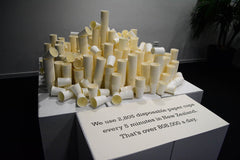 sources and emitting carbon. Reusable coffee cups are bulky and can leak in your bag – try a Stojo collapsible coffee cup which conveniently fits in your pocket or bag.
sources and emitting carbon. Reusable coffee cups are bulky and can leak in your bag – try a Stojo collapsible coffee cup which conveniently fits in your pocket or bag.
Speak Up – Fill in the CCC survey to let the council know how you are reducing your carbon emissions and how you’d like them to improve.
]]>
Plastic is lightweight and cheap, making it dangerously impactful on the environment. Think of a plastic bag and how much it resembles a parachute when it gets caught in the wind. Even if we don’t purposefully litter, we often unintentionally cause plastic to end up in the ocean. Here are some of the ways it happens and what we can do about it.

At the beach
At Cape Arnham in the Northern Territory in Australia footwear and jandals were found to be the most common item littering the beach. Jandals are inexpensive and when we think of them as disposable we neglect to look after them, often leaving them below the high tide line to be swept out to sea by the waves.
If every New Zealander loses a pair of sunglasses or jandals every year, there’s over 5 million plastic items straight into the sea.
Solution: Value your jandals as you would if they were expensive. Don’t leave any debris at the beach, including shoes, tents, plastic cutlery or cups.
Poor waste management systems
The majority of the countries that contribute to marine plastic litter are middle-income countries, where the economy is growing faster than the waste management infrastructure. However, New Zealand’s waste management systems aren’t perfect. Next rubbish day look at your street after the collection – there are always bits of plastic that have escaped as the wheelie bin is tipped into the truck.
Added to this, landfills aren’t sealed while they’re in use, so any loose plastic that is dumped can easily blow away. This plastic eventually ends up in the ocean.
Solution: Use a paper bin liner to make sure your rubbish is contained before putting it in the wheelie bin. Reduce your plastic consumption as much as possible to limit your rubbish.
Fishing gear
The largest contributor of plastic waste to the Great Pacific Garbage Patch comes from fishing equipment, amounting to a whopping 46% (by weight). These “ghostnets” keep drifting through the oceans entangling whales, dolphins and turtles. Whether or not you’re a commercial fisher, if you choose to eat net-caught fish you are supporting this practice.
Solution: Eat fish from the sustainable fish guide http://bestfishguide.org.nz/about/ to ensure you’re supporting safe fishing practices that do not harm ocean life. Look after your fishing gear, take it home and dispose of it correctly.
Microfibres
Every time we wash a fleece jacket it can release thousands of plastic fibres that are too small to be filtered out at sewage treatment plants. Studies indicate that synthetic fibres in our clothes could be poisoning our waterways and, by extension, the food we eat.
Solution: Wear natural fibres. Spot wash fleece and only machine wash them when absolutely necessary. Use face cloths and cleaning cloths made from natural fibres.
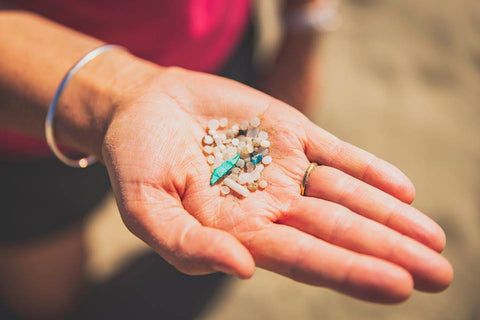
Manufacturing
Evans Bay in Wellington is covered with plastic ‘nurdles’ – the raw plastic beads or pellets used to make the products that we like to buy. These nurdles have escaped from the local manufacturers before they’ve even been made into anything useful, and have been described by environmentalists as “an oil spill, just a different form”.
The more plastic goods we consume, the more plastic is manufactured and the more nurdles are likely to escape into the ocean.
Solution: If we buy fewer plastic items, fewer nurdles will be created and land in our waterways. We’ll save money too, and space – you won’t have to Maree Kondoo your house!
Cigarette butts
Dropping cigarette butts is littering, and they go straight down the drains to the ocean. Cigarette butts are the most common item found on beach cleanups around the world, they’re made of plastic and do not biodegrade.
Solution: If you smoke, dispose of the butt in a responsible way. When you’re out use a pocket ashtray to keep the butt safe until you can dispose of it.
Littering
Ok, so we don’t litter but sometimes we accidentally drop a bottle lid, or ice-cream wrapper while we’re juggling the kids, the shopping and the car keys. If we all accidentally drop one piece of plastic every year, that’s five million pieces of plastic waste.
Solution: Accidents happen, so when you’re at the beach help others by picking up any rubbish you see. Download the app Litterati to make picking up rubbish into a treasure hunt – and join our Litterati club, named “The Rubbish Whisperer”, to add your total to ours!
]]>
Recycling soft plastics seemed like a silver bullet – we could eat the same packaged foods without feeling guilty about creating landfill waste, or ocean plastic pollution. But the problem with recycling being proposed and sold as a solution is that we all carry on consuming in the same way because "it can be recycled".
The Soft Plastic Recycling Scheme has taught us all a valuable lesson: most of the waste in household rubbish bins in New Zealand is likely made up of soft plastic.
 The scheme is planned for a return later this year but at a smaller scale which will leave most of the country’s soft plastics destined for landfill. So what can we do to reduce our soft plastic consumption? Donna Peterson from the waste management organisation WasteMINZ, asks "Do we actually really need to be using this amount of soft plastics? Are there alternatives out there that are actually better from an environmental perspective in terms of not creating waste in the first place."
The scheme is planned for a return later this year but at a smaller scale which will leave most of the country’s soft plastics destined for landfill. So what can we do to reduce our soft plastic consumption? Donna Peterson from the waste management organisation WasteMINZ, asks "Do we actually really need to be using this amount of soft plastics? Are there alternatives out there that are actually better from an environmental perspective in terms of not creating waste in the first place."
At The Rubbish Whisperer we love reusable alternatives to single-use plastics and want to help you begin ditching the soft plastic habit. So we’re putting our NZ-made reusable produce bags on sale until the end of Easter.
]]>(Catriona Gower – Otago Museum)

If you translate the Te Reo word Tūhura, you will find that it means “to explore, discover and bring light to”. This is an excellent choice for the name of the impressive new science centre at Otago Museum, Dunedin. The space, which opened in December last year, features 45 stunning hands-on interactives that unlock and explain some complex scientific concepts and ideas.
One of the exhibits Kia Rongo Ngā Niho (Sound Bite) is a kids' interactive which explores how sound travels through solid objects more easily than through air and involves a biodegradable straw from The Rubbish Whisperer! Sam Botting, the Science Centre Manager explained that the sounds waves that are heard on this interactive have passed from a rod, (which you hold with your teeth using a straw from The Rubbish Whisperer for hygienic safety), through your skull and vibrate against your eardrum.

The Science Communicator responsible for purchasing the straws for the exhibit, Catriona Gower, explained that as people are only engaging with the exhibit for seconds to minutes they wanted to ensure that the impact of the learning didn’t have a negative environmental impact. She explained the process that lead her to purchase from The Rubbish Whisperer:
‘When looking for suppliers we have quite strict criteria that we work through. Initially, we have to ensure the protection to the exhibits. Then, we want to ensure sustainability, so we required something that could be composted. Finally, we try to buy from companies that are NZ based as we are council funded and are keen to keep money in NZ and support a circular economy…ultimately, the principles behind your business sold me.”
She added, that while they did consider plant based plastics, which are more generally available and sometimes cheaper, they are still actually plastic and therefore can’t be composted. A common misconception for a great deal of ‘eco-packaging’.

The success of this exciting educational space is evident in the huge visitor numbers which it has drawn to date. So, if you are looking to plan a weekend away then why not head down to Dunedin to make some discoveries of your own!
]]>Okere Falls Store can be found on State Highway 33, a scenic 20 minute drive from Rotorua. This unique venue offers a fantastic menu of delicious food 7 days a week but also hosts a gourmet store where you will not only find local, organic produce and European epicurean treats but also a range of reusable, waste reducing, eco products. This summer Sarah Uhl, the drive and passion behind this 15 year old venture, added a new product to the shelves - The Rubbish Whisperer’s reusable water balloons, which have been so popular they have already sold out once!

“Water balloons are heaps of fun but they are complete nightmare in terms of plastic waste. You don’t want to be the Christmas Grinch and say ‘no water fights’ but the ones stocked in the supermarket are ridiculous. When I saw the reusable water balloons on the website I thought ‘they are so cool, what a great solution.”
A set of 3 balloons retail for $24.00 and come in a range of gorgeous bright summer colours. The price is considerably higher than the commercial high street plastic alternatives but are great value when you consider there are no environmental impacts and are handmade in Christchurch by people who are all paid the living wage.
“Christmas is a great time to educate people. This year we have sold lots of reusable coffee cups, straws and produce bags. Giving those gifts encourages people to think and talk about the plastic issue – it becomes a conversation. You can use the commercial side of Christmas to try and encourage change.”
Sarah’s feelings on the recent announcement on the ban on plastic bags in NZ is being echoed across the environmental and eco communities around the globe – “the plastic bags are an amazing start but now we have to start looking at our plastic use more generally. Producers have to change and the government needs to start taxing producers who use unnecessary plastic in their packaging”.
As global consciousness begins to grow about the significance of the world’s plastic problem it is time for us to take a leaf out of Sarah’s book, using occasions like Christmas and birthdays to gift and use reusable products. It is true we can’t fix the issue alone but we can be less culpable and try to encourage others to consider the bigger and more significant journey towards lowering our reliance on plastic.
]]>Here are a few easy things that you can put on your list of new year resolutions heading in to 2019 to reduce your impact on the environment.
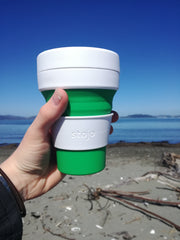
Set a rule of ‘No keep cup, no coffee’
The best way to make sure you stick to your reusable cup goals is to not allow yourself a drink out without it. You will quickly find you will be in the habit of having it on you all the time!
Scrap food waste
Food waste accounts for 1 third of landfill waste in NZ. You can have a major impact on this by putting your food scraps in a home compost, Bokashi bin or worm farm. If you have a Council run organics collection, check what they can take – often they take all cooked and uncooked food as well as pizza boxes and serviettes.
Learn to let your fridge be empty
We tend to not like white space in our refrigerators – this means we pack them full so that we feel like there is always food on hand, but the reality is that we lose track of perishable food. The way to change this is to only buy new perishable food once you have almost finished everything in your fridge. This way you wont lose track of anything, will plan meals around what you have before you buy more and reduce your household’s food waste.
Take your own lunch
By taking a packed lunch to work you instantly avoid that tricky guilt moment when you are hangry (hungry/angry) and there are only wasteful takeaway options available. Unwrap your sandwich wrap and be happy!

Take your own container
We understand how hectic life can get and how you often can’t avoid takeaway options. This is where having a container in your car or bag can be handy – grab your sushi on the run and you won’t have to stop and think about all that single use packaging.
Simplify your cleaning
Switch your all-purpose sprays to white vinegar and you will be surprised how much plastic (and money) you will save. Usually white vinegar is all you need to keep the place germ free but if you need harsher stuff you can make your own citrus infused white vinegar or baking soda/washing soda scrub.

Bags in bags
With the plastic bag ban coming in to effect in 2019 and the Soft Plastics Recycling Scheme on hold, now is as good a time as any to get into the habit of having your reusable shopping bags in the car for your groceries. If you’re going to have a shopping bag, might as well fill it with reusable produce bags!!
Skip the straw
When ordering a drink at a café or bar, ask for no straw. This not only reduces your waste but also shows the café that their customers care about the environment, which in turn may lead them to start reducing their business’s waste.
]]>In NZ every year the food wasted produces carbon emissions equivalent to over 118,000 cars and yet no-one wants to waste food – especially when it costs us money. This isn’t a case of anyone doing anything ‘bad’ just that we need to pay attention to the problem.
The resources used to produce, package and transport food are huge and if we waste food then we’re just destroying the earth to grow food that no-one eats, while at the same time there are many people who don’t have enough to feed their families.
It’s so great to see SkyCity tackling this problem and diverting nearly 500 tonnes of food waste from landfill, while donating surplus food to KiwiHarvest, scraps to EnviroNZ for compost and working with Ecoware to transition to compostable packaging.
SkyCity reducing food waste is an easy win-win situation, or actually a win-win-win-win-win situation – saves money, provides food for people who need it, makes compost to grow more food, reduces greenhouse gases and reduces plastic packaging – what’s not to like?
Check out this great video from the University of California Climate Lab for more info on food waste and climate change:
]]>The reusable water balloons are great because you never run out of water balloons! It is a sunny day, you want to have a water fight – you don’t have to go to the shop! If you have reusable water balloons, you always have them on hand.
The other good thing about the water fight is that at the end of it, when everyone is cold and hungry, you don’t have to spend all the time picking up little bits of balloons from the garden.
These water balloons last longer than disposable balloons – all you need to do is dunk them in water once, and then you can throw it 3 or 4 times before you need to dunk it again. So, your water fight can go all day.
You don’t have to cue at the tap, you don’t have to tie that awkward knot and you don’t have to spend time picking up rubbish at the end of the day.
It is better for the environment because you only need one and you can throw it again and again. You don’t need to keep buying them.
We have a range of colours and they are made by hand in Christchurch.
]]>Bangladesh is where my journey away from single-use plastics began. While living there, and in Nepal, in 2009-10 I saw what happens to plastic rubbish when it’s not conveniently taken away into landfill.
Now 10 years on, I’ve started to realise how plastic pollution affects not only the environment, but inequality as well.
Bangladesh is the 12th most densely populated country in the world and the 145thby GDP per capita (by comparison NZ is 198thby population density and 28thby GDP per capita)
It’s a low-lying river delta, and millions of people live near the water. When the monsoon rains come the rivers rise quickly. When the rivers, drains and canals are blocked by plastics flooding worsens bringing increased hardship to people already living in poverty.
“In the slow process of their decomposition, the plastics release toxic chemicals which are now being detected in human bloodstreams and may cause cancer, infertility, birth defects and many other ailments.”
When plastic decomposes in the water supply that is relied on for drinking and washing then the people who are most vulnerable are also likely to suffer the most from the plastic toxicity.
https://www.breakfreefromplastic.org/2018/11/16/4000-tons-single-use-plastic-bangladesh/
Photo: Helen in Dhaka 2009
]]>Wellington Diving Club is based at the Regional Aquatic Centre in Kilbirnie. It is one of the most successful diving clubs in New Zealand and helps coach and encourage recreational and competitive divers from the age of 5 years and up. Its top athletes compete on a national and international level. We spoke to Susan Smith, the current club Secretary, who successfully co-ordinated raising over $1000 in just 6 weeks by selling reusable produce bag packs from The Rubbish Whisperer.
“There are 42 families in the club and this year I was looking for a healthier, greener alternative. I googled ‘eco fundraising’ and several NZ options came up but some of the products I thought would be too hard to sell. Produce bags have a broad appeal.”
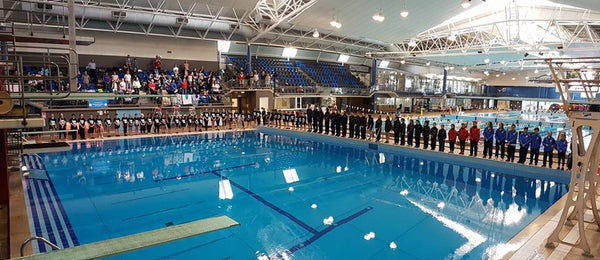
The club which is set up as a non-profit organisation and administered by volunteers – it’s funded through a mix of fees from divers, grants from organisations and trusts, and our own fundraising. The proceeds from fundraising go towards their basic operating costs such as hiring the pool or dry gym.
Susan explained to us how the produce bag fundraiser worked…”it was really simple, I got in touch with Lisa ([email protected]) who was easy to engage with, friendly and a good communicator. So, we ordered a pack for each family in the club and gave it to them with a poster explaining the ethical and environmental reasons why these bags are different to others on the market. People placed their order and picked their bag colours on a sign-up sheet and then these were returned with the money”.
The club put through a tot al of 3 orders to meet demand, all of which were delivered quickly. Perhaps it was the timing, being just before Christmas or just great timing with the announcement of the plastic bag ban which will begin in 2019.
al of 3 orders to meet demand, all of which were delivered quickly. Perhaps it was the timing, being just before Christmas or just great timing with the announcement of the plastic bag ban which will begin in 2019.
“Many parents took them into their work and the orders rolled in! They sort of sold themselves. When you are fundraising you are putting yourself out there, asking people for money but this product felt much easier to approach people with - you didn’t need to feel apologetic because of the environmental aspect – it feels good.”
There has also been some lovely feedback from the people who purchased the products – one story involved a young lady who has had several check-out staff congratulating her on using the bags! We asked Susan if the diving school would work with The Rubbish Whisperer again and the response was clear: “Oh yes! They were great to deal with and really responsive and friendly”.
Check out Wellington Diving Club's Facebook and Instagram for more information about their Instagram
]]>
This is depressing but it's also good chance to think about how we can help to close the gap. Purchasing from businesses owned by women is one way.
At The Rubbish Whisperer we consciously choose to support NZ businesses owned by women.
Here some of our favourites:
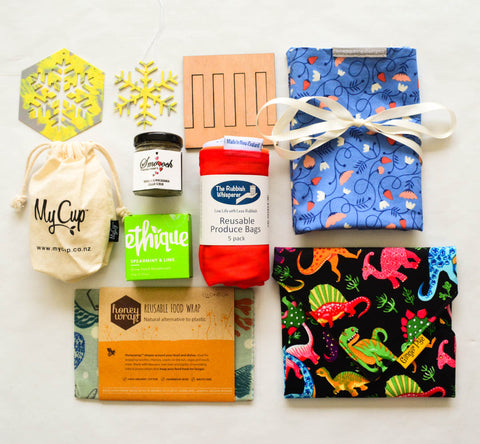
Smooch manufacture our new make-up remover and have a great range of other skin care products - made in Nelson; business owned by Corrin.
Our friends at MyCup manufacture menstrual cups in Christchurch, and help to end period poverty. Kimberli employs 4 women - keeping jobs in NZ and saving tonnes of menstrual products going to landfill every year.
Brianne at Ethique employs 8 Kiwi woman and makes shampoo bars that are loved worldwide.
Convergence PR is owned by Leigh and Erin and supply marketing and PR to businesses and organisations big and small.
We're excited to be working with Sarah from Wrapper's Delight who, through innovative product design, has made reusable gift wrap easy to use, waste-free and beautiful.
Remix Plastic bridges the gap between technology and education. Anthea uses 3D printing and laser cutting to make practical products from recycled plastic and inspires students to combine technology and sustainability.
Tara from Honeywrap collaborates with NZ designers to produce beautiful reusable beeswax food wrap in Auckland and has saved over 2 million km of plastic wrap.
Nicola from GingerPye manufactures reusable sandwich wraps that we've been pleased to stock for 5 years.
7 great NZ businesses owned by women and preventing plastic pollution at the same time - we're honoured to work with you all.
]]>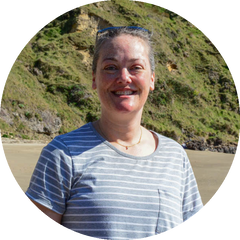
Originally from the United Kingdom, Julie and her husband, Kris, fell in love with the small community town of Diamond Harbour while on holiday in New Zealand. Soon after purchasing their first home in the area, Julie fell pregnant with her first child.
Wanting to be a full time mum, Julie stopped working to raise her children. After the earthquakes in 2011, Julie was less eager to go back to work, especially if it meant commuting 45 minutes by car from Diamond Harbour to the city.
After a friend passed on Julie’s contact details to Helen Townsend-Rupp, founder and owner of The Rubbish Whisperer, Julie found exactly what she was looking for.
She joined The Rubbish Whisperer as a sewer and cutter, working on creating handmade produce bags.
“When I first started sewing, I was doing about 100 reusable produce bags a week. It has since increased to about 300 a week as the zero plastic waste trend has grown,” said Julie.
Julie enjoyed working again with the flexible hours and convenience of being able to work from home, while maintaining her mum duties.
“There are no negatives for me working here. The children understand what I am doing and they are proud of me for being a part of a company that is doing some good in the world.
“It is also a great example for my daughter to see Helen, with an environmentally and ethically conscious business, succeeding and helping other woman in the community to succeed as well.”
The Rubbish Whisperer currently employs 8 local woman and ensures all staff are paid the living wage.
“It’s phenomenal for a local small business to have that stance, it makes you feel really valued as an employee.”
The Rubbish Whisperer was formed in 2013 by Helen Townsend-Rupp to reduce rubbish by eliminating single-use disposable plastic.

“Helen really cares about what we think and how we feel. Part of all purchases go to local environmental charities, and she has let us put our suggestions forward on where some of the donations should go to. It made me feel like I was really part of a team.”
Since working for The Rubbish Whisperer, Julie has cut out single-use plastic from her family’s everyday life, even switching to bars for their soap, shampoo and avoiding plastic in their cosmetics purchase.
“Working here has made me more aware and I now do anything to avoid using plastic. Before I would use reusable bags only when I remembered them, and produce bags and paper straws were never even on my radar.
“For my children, it will be second nature for them to avoid plastic covered food or items. If they are doing it now at a young age and it is their normal, then it will be abnormal for them to switch back to plastic use when they are older.”
]]>Straw Free September, it’s become an annual, global movement. A month where we are encouraged to politely refuse the straw, helping spark thought and discussion around the massive impact cheap, disposable single-use plastics are having on our environment. It is hoped, that this simple trigger encourages us to look more widely at what other unnecessary and easily replaceable plastics we rely on as part of our daily lives.
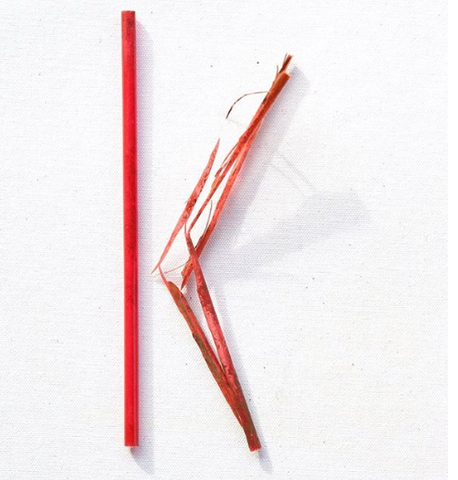
Plastic Straw rescued from the sea by Clean Coast Kiwi
However, for some people in our communities being strawless is problematic or even impossible. Those with physical needs, disabilities, people in medical care or the elderly, may rely on a straw to help keep them hydrated. Many of our product lines are developed in response to customers feedback or requests and our range of biodegradable bendy straws has been introduced to meet the needs to these markets. It means that conscious carers are able to support clients while also avoiding the long-term damage that plastics cause.
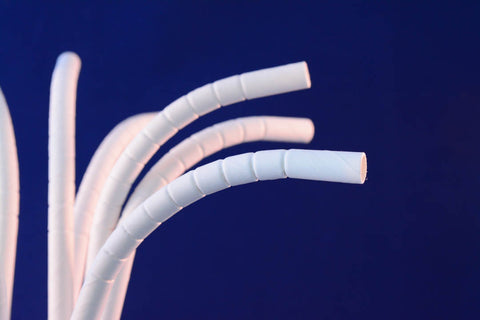
As our southern hemisphere Spring kicks into action and before Plastic Straw Free September comes to an end, now is a great time to take stock and make changes. In addition to the annual spring clean why not consider an eco-clean too? How about swapping out 3 things from your daily routine that use plastic? It could be as straightforward as a traditional toothbrush for a bamboo alternative, plastic bin liners for paper ones, reusable beeswax wraps for cling wrap or a plastic dish brush for a bamboo scrubber. Visit our store today and get your green glow on by making a simple swap.
]]>
OWNERS & MANAGERS: DANIEL MENDOLA & ALLY DODSON
This place is truly one of a kind. Owned and managed by a driven, inspiring young couple who place great importance on delivering a high quality sustainable tourism experience, it is set on the beachfront of a picture-postcard lush tropical paradise. The family friendly resort attracts active, independent, nature loving guests keen to make the most of the impressive marine environment and jungle wildlife.
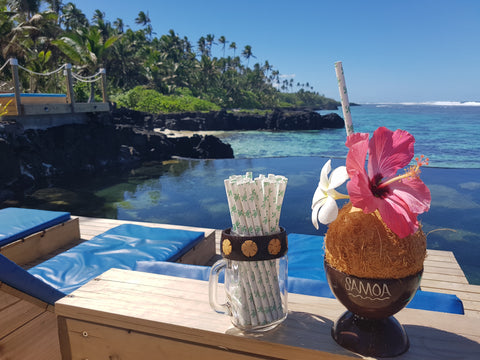
What did you want to be as a kid?
Ally – an archaeologist
Dan – a fighter pilot
What living person do you most admire, and why?
Ally – Serena Williams because she is strong, believes in her convictions and carries them through. She doesn’t let critics or negative press get in the way of her achievements on or off the court.
What is your favorite quote?
Dan - “Never look down on someone, unless you’re helping them back up.” (Jesse James)
What people say about our straws?
Most of our guests love that we have a no plastic rule at the resort. It’s all about education, with staff and guests - not expecting a straw with every drink they buy. Hopefully, it will soon be the norm that plastic straws aren’t served by anyone, anywhere across the world.

What is your proudest moment?
It is so hard to isolate a single proud moment, however, living an authentic life without conforming to mainstream society or what is expected of us as people. Also, working hard as employers and trying to help others, who may not be as fortunate as us.
What is your biggest work-related challenge?
Waste management and educating local staff about the need to be plastic free so that they look after our village and their country. Most guests are happy we have banned plastic from the resort but there are still some who automatically expect plastic bottled water. We offer free filtered water and we encourage guests to bring a reusable flask with them.
Why should other cafes / people make the swap to paper straws?
Every little helps - slight changes worldwide will have a massive impact, especially for the coming generations.
How do you relax?
If we have a couple of days off from the resort we love a jungle hike to explore less well known spots on the island.
What keeps you awake at night?
The sound of the ocean and the jungle - it’s super loud here in Samoa!
What will you do when you retire?
We would like to enjoy time traveling to new places and visiting new countries, but we have heaps of ideas so will be working for a few years yet!
What impact has swapping the straws made on your business?
It’s something we set as a business goal in 2016 and have achieved – it is awesome when a guest mentions they have noticed we have no plastic bottles or straws. We are hoping for a plastic free Samoa soon.

FIND OUT MORE:
]]>
There is a 57 page consultation document but if you don't want to read it then here are some important points, and check out Wanaka WasteBuster's submission.
- The bag is only on bags with handles, so plastic bin liners, produce bags and dog poo bags will still be on sale.
- Plastic bags with handles will still exist, they will just be thicker. How much thicker is a key part of the consultation.
The thickness of a bag is a key factor in determining whether the public will treat it as a reusable bag or as single use bag. The thicker the bag in theory the more likely people are to reuse it. The government is proposing either a ban of bags under 50 microns or under 70 microns.
The photo attached is taken from the consultation document and gives you a good idea of what kinds of bags you can expect at the different levels of microns.
The Rubbish Whisperer supports a ban of plastic bags under 70 microns and this should include compostable bags until there is the necessary national infrastructure to collect and process them.
Thanks to WasteMinz for the photo and summary points
]]>

When we reduce our own individual waste by avoiding packaging and buying local, we end up contributing to a more circular economy – that is, one in which products are manufactured, grown or produced locally and are reusable, repairable, and valuable. By supporting local businesses and ventures we not only support jobs in our community but form relationships with the producer – they can then support us by repairing or customising our products and by taking back any components to be reused. Manufacturing on a local scale also provides communities with independence and self-sufficiency that then gives them resilience in tough times.
The Rubbish Whisperer sees a future of circular economics. We aim to provide a stepping stone from the old linear system to the new circular one by producing our products locally where possible; we support the local craftswomen who make our reusable produce bags and makeup wipes. They can then put their income back into our local community which indirectly benefits us. We repair produce bags if needed and we see the fabric scraps created in manufacturing as a resource not as waste, and use them to tie sets of stainless steel straws or as part of craft kits. We also reuse cardboard boxes for packaging so we use less virgin material.
Some of the products we offer are intended to be transitional items; for example, paper straws are a stepping stone between plastic straws and no straw at all! (with acknowledged need within disabilities).
At The Rubbish Whisperer we provide good quality products that are made to last, whether it be a paper straw that won’t go soggy or a reusable produce bag that you will have for years. We acknowledge as a producer and retail agent that we have a responsibility to not only reduce our impact on the environment, but also to help reduce yours.
]]>The recently released Plastics B.A.N. (Better Alternatives Now) List is a series of reports that identify the world’s most polluting plastics in order to better protect our oceans. This report also examines the true life cycle of “plant-based” plastic products, finding that most do not actually break down and that the terms “compostable” and “biodegradable” may be the next generation of greenwashing. The Aardvark biodegradable, compostable paper straws that The Rubbish Whisperer sells were shown to be one of the most sustainable brands. If they make their way into the environment they disappear on land and in water within 6months.
The Rubbish Whisperer has pulled out information from the report that is relevant to paper straws.
The Plastics BAN List 2.0 includes data from across the United States, focusing on plastics that present the most significant chemical hazards in manufacturing, those that are the most dangerous when absorbed by humans and which persist longest in the environment. Items reported as top offenders include food wrappers, bottle caps, beverage bottles, bags, straws, and lids, made primarily from polypropylene, polyethylene and polystyrene plastics.
Annually, eight million tons of plastic escapes collection systems to end up in the ocean, where it contributes to the 5.25 trillion particles of plastic smog that choke our marine ecosystems. The Plastics BAN List series provides a window into the true environmental and human health costs of plastics, and can be used to help corporations understand their responsibility to design less harmful products.
Leading non-profit conservation organizations—5 Gyres Institute, Algalita, Californians Against Waste, Clean Production Action, Plastic Pollution Coalition, Responsible Purchasing Network, Story of Stuff, Surfrider Foundation and UPSTREAM—joined together for the project.
]]>
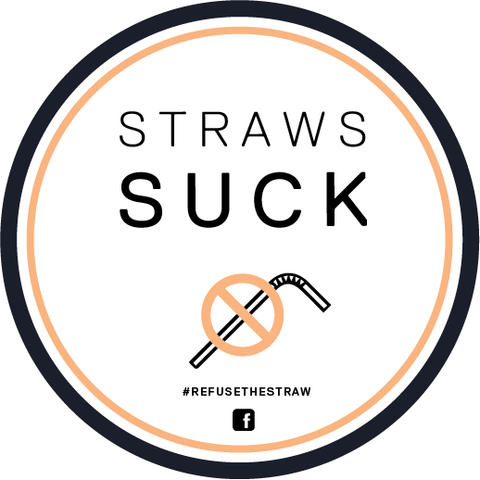
#strawssuck is trending and not just in NZ, it is a global hashtag that smaller, local communities are embracing to motivate real shifts in people’s awareness and habits. If you haven’t seen this pop up on your Instagram feed then you better go search….
Straws Suck (The Mount) is just one of NZ’s communities tackling the issue of plastic straws as a huge contributor to marine pollution. The Mount Maunganui campaign, powered by Sustainability Options and Kickit is on a mission to build awareness around the impact these, and other damaging single-use plastic products, are having globally.
“The state of the environment is alarming… we admire those people who are part of the zero waste movement and we want to get there…”
…But Rachel recognizes that it is a journey which requires knowledge and support to take the first steps towards change. There is always strength in numbers and by being engaged and connected face to face, makes change is so much easier.
Launched in March this year by 3 surfers and a sustainability expert, the project’s first target was plastic straws but has gradually and organically expanded. They’re building a community primarily through their Facebook page but have also run a workshop with student champions from local schools as well as breakfast sessions for people wanting to be part of Plastic Free(ish) July. Though this work they have offered advice on how to produce less waste (and learned from others!), unpacked some of the myths and unexpected realities of recycling and composting in Tauranga, and provided guidance on buying products that are less damaging to the environment in their entire life cycle. Through this journey they’ve learned it is hard to reduce all single-use plastic in your life and often hard to know what products are actually less damaging for the environment. The key, Rachel says, is to be realistic about the fact we’re all learning how to be better and provide basic, easily understandable information that people can translate into their daily lives and habits.

“We made the choice to build an engaged following of local people and are on a mission to bring together a community who can then facilitate change.”
Initiating change on a local level can be more rewarding and powerful than ‘liking’ something through our social media feeds and making the occasional share or post related to environmental change. Genuinely connecting to people in our locality who hold the same shared positive beliefs means that we can share our stories and celebrate our wins in a more rewarding and real way. The outcomes of the Straws Suck The Mount are promising; the community is small but continues to grow slowly but steadily - the vision for the future after banning plastic straws?...
“We want to continue to build a local, engaged following which will support each other and work together to tackle larger plastic issues in our community; like the amount of produce stocked at our supermarkets which have unnecessary plastic packaging.”

The Sign of the Kiwi is an iconic Christchurch landmark. Designed by architect Samuel Hurst Seager and opened in 1917 as a teahouse, the building is now registered as a historic place. Following the 2011 earthquake the building has been through major strengthening and reopened on the 23rd January 2017. The delightful space offers indoor and outdoor seating with incredible views over the city to the Southern Alps and is popular with walkers, bikers, tourists and locals alike. For stunning views, exquisite coffee and delicious food - head up the hill!
LOCATION: Port Hills, Christchurch
MANAGER / OWNER: Eric Devos
Sum up your café in 5 words…. Home cooking, true, warm, unique, friendly.
What did you want to be as a kid? A fireman, like every other boy!
What is your favorite quote? “Perseverance pays”
What people say about our straws? They love that they are biodegradable. It is part of a change at our café, in August last year we stopped using takeaway cups- we had too much rubbish and then there's the whole idea of the planet being destroyed by coffee cups. Instead we have a mug wall where people can borrow a mug!
What is your proudest moment? My daughters being born.
What is your biggest work-related challenge? Agreeing and getting on with my business partner Janice (hehe).
When are you happiest? When I am travelling.
Why should other cafes / people make the swap to paper straws? Stop plastic; it’s killing us! Go for biodegradable or recyclable materials.
How do you relax? Reading or playing tennis.
What keeps you awake at night? Alcohol!
What will you do when you retire? Go sailing.
What impact has swapping the straws made on your business? People are keen to supporting the fact that we try not to use plastic.
FIND OUT MORE:
]]>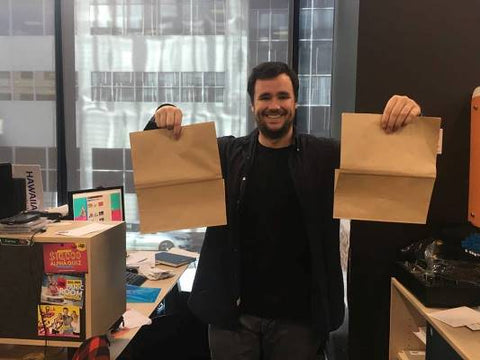
From our observations of conversations and discussions during Plastic Free July we have noted that people generally feel guilty for their plastic use and want better alternatives. Our paper bin liners, for example, were incredibly popular, with people saying that they didn’t even realise these existed, or that the plastic bag bin liners were one of the things they didn’t know what to do about. By providing these simple solutions we hope to provide Kiwis easy ways to reduce their plastic guilt.
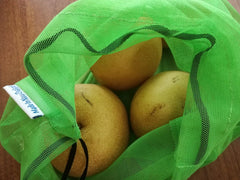
To make all these often-overwhelming changes even easier, we are going to run a series of videos about simple switches; including the good, better and best options, the price and waste comparisons and the reasons why these changes are important.
Keep an eye out for these in the next few weeks and send us your picks for things you would like to see!
]]>Why use paper straws? There’s no excuse for plastic straws any more. Have you seen the turtle video? Our paper straws are durable, food safe, look great, are flexible and don’t pollute. Why wouldn’t you use paper straws?
Are paper straws are better than plastic? Absolutely! Plastic straws pollute. They are in the top 10 items found worldwide in beach cleanups and they don’t break down in the ocean so they can be eaten by marine life.

What are paper straws made of? Our paper straws are made of paper and packaged in cardboard – no plastic lining, no beeswax, no coatings.
Are paper straws lined with plastic? Some paper straws are lined with plastic but straws supplied by The Rubbish Whisperer are never plastic lined.
Are paper straws wrapped in plastic? All our paper straws are packaged in cardboard – what’s the point of buying paper straws if they are plastic wrapped?
Are paper straws safe?Our paper straws are made from 100% FDA and EU food-grade approved, and the inks are safe for food contact.
How long do paper straws last? Our Aardvark paper straws last up to 2 hours in your drink – that’s 20x as long as Chinese made paper straws.
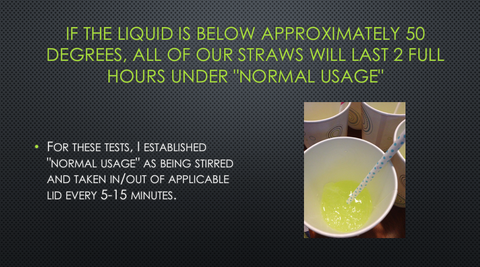
How well do paper straws work? Seven Sharp tested our straws - they really do work!
Are paper straws environmentally friendly? Yes, our paper straws are made from sustainable forest and start breaking apart in the ocean in 3 days.
Are paper straws biodegradable? We only sell Aardvark paper straws because they are proven to biodegrade on land and in the ocean, they start falling apart in sea water in 3 days and break down within 6 months in a marine enviroment:
Can you recycle paper straws? Even though our straws are made out of paper, most recyclers will not accept food contaminated paper products so please compost your paper straws.

Are paper straws sustainable? Aardvark paper straws are made from sustainably managed forests.
Where can I buy paper straws? The Rubbish Whisperer supplies paper straws to NZ and the Pacific Islands.
Where to buy bulk paper straws? We can provide 350 straws to over a million straws
Where to buy wrapped paper straws? The Rubbish Whisperer will be providing wrapped paper straws in the next few months. Let us know you’re interested and we’ll add you to the pre-sale list.
What can I make with paper straws?
Our paper straws are so durable that they’re better for crafts than plastic straws. Check out some of our crafting ideas. We can supply discounted bulk crafting straws to schools – get in touch to find out more.

]]>
By Helen Rupp, founder and CEO of The Rubbish Whisperer
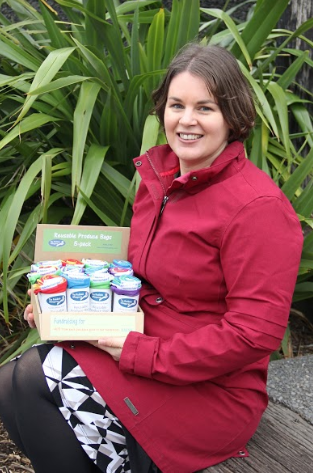
Since starting The Rubbish Whisperer five years ago, I am constantly blown away by our ability to start over. It doesn’t matter if you’re not a ‘greenie’ or have been using loads of plastic, every morning presents an opportunity to start fresh and try again. Thanks to this sentiment, we have sold over 30,000 reusable produce bags, thereby saving 16 million plastic bags from being used.
In 2009, I had my own “fresh start” moment. I had the opportunity to live in Nepal and Bangladesh for a year where I was involved with working in the Botanic Gardens in Kathmandu. I was assisting to digitise their plant collection. In Bangladesh, my job was a little different. I was instructing teachers on how to use computers, which was rewarding in its own way.
Two different countries and experiences, but there was one thing that they both had in common. There was the massive amount of rubbish on their roads and rivers visible to me every day. I realised that in New Zealand we were fortunate to have our rubbish conveniently taken away every two weeks, but at the same time we are never confronted with just how much waste we produce.
After this realisation, I knew that I needed to make a change.
Avoiding palm oil was my first step. However, this was proving to be very difficult and time-consuming: I was having to read every single ingredient label in the supermarket. I then decided to try and cut out as much everyday plastic waste as I could.
In 2010, while pregnant with my daughter, I had time to research the environmental impact of plastic and how to reduce my own waste. There was a lot of information available on the internet, however, not everyone is likely to have the time or interest to find it all.
The Rubbish Whisperer was first created in 2013 as an information platform, where I could gather all the research I had done into one place for the convenience of those interested in finding out more about reducing plastic waste.
It was around this time I began to make the first reusable produce bags. I would bring these along to talks that I would do at schools and homes on reducing household waste.
As the anti-plastic waste trend grew, more people were offering talks on reducing waste and doing a fantastic job drawing attention to the plastic problem. However, not many businesses were providing simple solutions for plastic-free alternatives.
In 2014, I uploaded the first products to The Rubbish Whisperer website, which were my handmade reusable produce bags, bamboo toothbrushes, beeswax food wraps and snack pockets.
From there, The Rubbish Whisperer has only grown and grown. What started off as a simple research and ideas-based company turned into an action platform where the everyday person could actively change their plastic habits, without having to go out of their way to do so.
One small idea flourished and has now enabled others to make a positive impact in their lives.
Here are just a few of the things we’re proudest of:
- We offer a living wage to 13 woman.
- We’ve made over 30,000 reusable produce bags, saving over 16 million plastic bags.
- Over $100,000 has been injected into the New Zealand economy by making our reusable produce bags here in New Zealand.
- We’ve replaced over 1 million plastic straws with paper ones.
- We’ve donated a portion of profits to environmental funds including Banks Peninsula Conservation Trust and Squawk Squad.
It has been quite a journey and I am always learning as I continue my mission to try and reduce the plastic waste in New Zealand and the rest of the world.
Here’s to the next five years!
]]>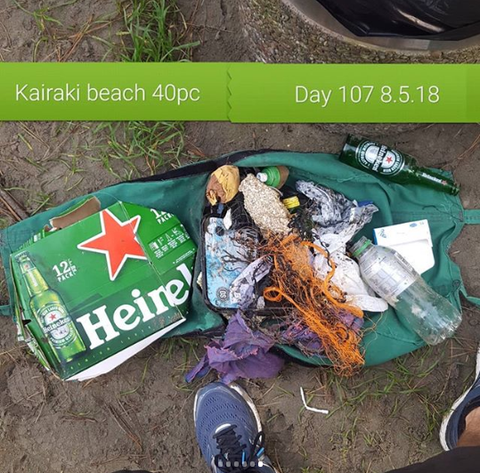
What inspired you to begin this project?
I was seeing a lot of rubbish on my runs and one day I thought ‘I need to pick it up’ - it was as simple as that.
What did you set out to achieve?
I wanted to show, that even though our beaches appear clean, if we look closer there is a lot of rubbish there. The project was a simple challenge – on my daily runs, could I pick up 1000 pieces of rubbish on a 4km loop? The time limit was 70 days and on every run I would post the images on my Facebook and Instagram page. You could say it was a disappointing success!
When you aren’t running, what do you do?
I have two jobs; I work as a medical scientist in microbiology and I also run Liberation Jewellery where recycled wood and industrial offcuts are repurposed into beautiful jewellery. In my spare time I work as an artist, mainly sculpture.
Have there been any unintended or surprising outcomes to the project?
The video - which was a collaboration between myself and David Thorpe (who I met via Facebook) and is now being used by Eco Educate as a teaching tool in 123 schools in North Canterbury.
What are the three oddest things you have found out running?
- Three buckets of engine oil (I called the council and they removed it)
- A twenty dollar note (Yesssss)
- A car radiator
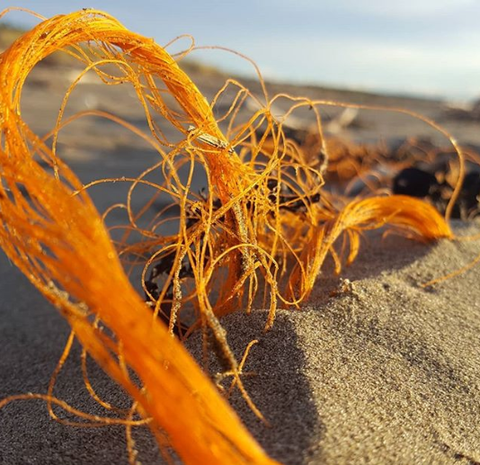
What are the most common items that you find?
- Bottle caps
- Bottles
- Plastic straws
- Plastic bags
- Polystyrene
- Fishing line/nets
- Takeaway containers/cups
- Broken down miscellaneous plastic
What is the future for the project?
I have carried on past the 70 days - I am now up to 129 days and over 13000 pieces of rubbish. I am considering a plastic straw challenge where I would spend a month collecting discarded straws at all the spaces and places I visit and travel to.
What can people do to make a difference to costal rubbish?
Love the land we all stand on and be kind to it. Go to the beach and clean up. Use reusable bags, cups, bottles and straws etc.
For more information
]]>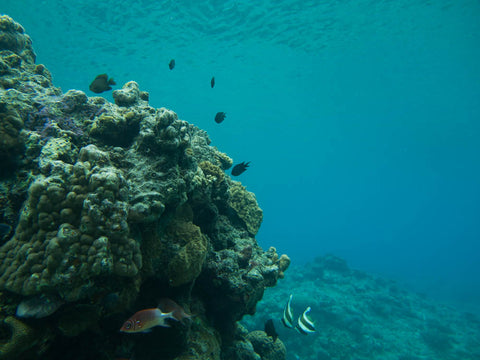
World Oceans Day will be marked this year on June 8th. This annual global celebration aims to help raise the profile of the ocean, highlight its importance in our lives and inspire more involvement to help to conserve this amazing resource, on which we all depend.
Since its inception in 2002, the global network of partners for the project has grown to include approximately 2,000 organizations that include, to name a few; aquariums, youth groups, sailors, governments, conservation organizations, educational establishments, the tourism sector and businesses.
This year NZ has several reasons to be smiling about its support of this awesome project. Firstly, the day before the event, the government will enforce regulations to ban the sale and manufacture of certain types of products containing plastic microbeads. Secondly, there are some great events taking place across the country to get involved with. To list or find out what is taking place near you, click on the link below: Events For World Ocean Day
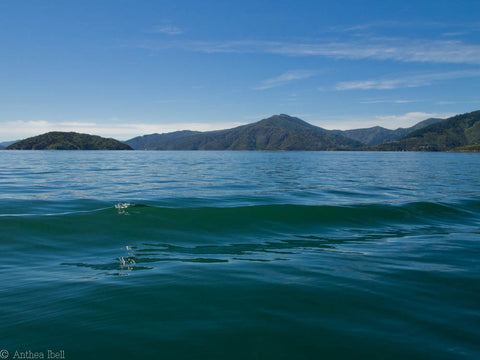
There are some motivated individuals, celebrities, community groups, organisations, businesses and political figures fighting to preserve the future of our seas; connecting to them through social media can offer valuable inspiration and facts to help fuel changes in our own lives. Here are our 6 Simple Steps To Help The Ocean Survive, with some links, to people already doing great things for the ocean:
- Pick It Up
One man’s healthy crusade to limit plastic in our oceans - Matt Akhurst aka therubbishrunner1 encourages us not to turn a blind eye to rubbish but to simply pick it up.
- Make Changes & Document Them
This simple project lead by a young generation of projectbluenz group of young NZ’ers changing the way they use single use plastics and documenting their journey, beautifully.
- Use Your Influence
Use your contacts and networks, just like leonardodicaprio, to spread the word. However small or large your sphere of influence you can.
- Collaborate To Find Solutions
theoceancleanup is a huge project marrying the best of technology, science and eco-change by experts across the world – their focus is the world’s largest clean up.
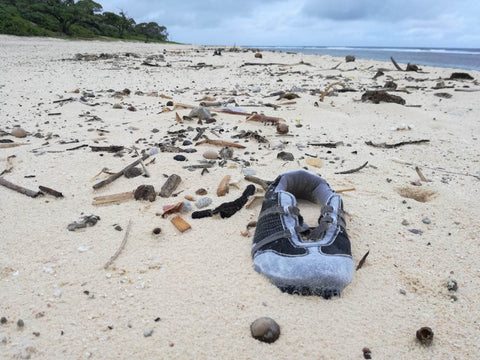
- Get Educated And Inspired
There are lots of collectives and organisations seeking to inspire and educate us towards change and earthmama.nz is just one NZ site where you can find well-presented facts and ideas.
- Go to the top
Our politicians get paid to listen to what their constituents want, need and believe. Connect with the PM jacindaardern or your local MP and ask them to get involved in promoting ocean friendly initiatives.
]]>
As a global community we grow enough food to feed the world and yet 3.1 million children under five die from poor nutrition every year. People are not the only ones losing out; precious resources used to grow, process, package, transport, market and sell food are also pointlessly wasted. It is hard to comprehend, but a shocking 25% of all the fresh water consumed annually across the world and 300 million barrels of oil are used to produce the 1.3 billion tonnes of food waste that ends up uneaten every year.
Are you shocked, amazed and feeling a little more thoughtful about yesterday’s leftovers? We certainly are. While most of us don’t like to waste money, New Zealand households throw away an average of 79 kgs of edible food each year, with a price tag of around $563. Rather than dwell on the mental image of shoving a $10 note (plus a handful of change!) in the bin each week, let’s get motivated to be more conscious of what we buy and how we use it. What we can do at home, does make a difference and enough small changes really do bring big shifts.
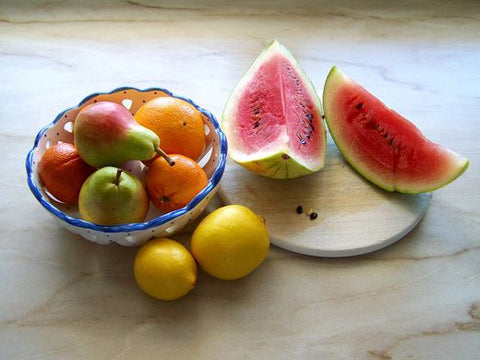
Here are some super easy tips, tricks, suggestions and links for you to find out more, so we can all make sure, that the food we buy, is also the food that we use….
Plan your meals so that you only buy what you need – there are some great apps to help make it simple
- Know the difference between the use by and best before dates
- Use veggies in the priority if getting old e.g. use lettuce before carrots as carrots will keep longer
- Keep fruit and veggies in the right place – they don’t all need or enjoy being in the fridge
- Never use detergent or bleach to wash un-organic produce – use a bamboo brush to buff clean
- Make sure you know what to separate - certain fruit/veggies shouldn’t be stored together as they produce gases that speed up ripening
- Place broccoli and spring onion, upright in a glass of water to keep the tops fresh
- Leafy greens like lettuce, kale, silverbeet and spinach are best kept in an airtight container with a little water
- Use peelings and off cuts to make your own veggie stock that you can freeze and use at a later date
- Refrigerate or freeze all cut, peeled, or cooked fruits / vegetables and leftovers within 2 hours
